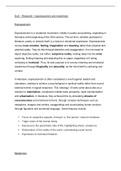DoS – Research = expressionism and modernism
Expressionism
Expressionism is a modernist movement, initially in poetry and painting, originating in
Germany at the beginning of the 20th century. This art form, whether portrayed in
literature, poetry or artwork itself, is a brand or emotional expression. Expressionists
convey inner emotion, feeling, imagination and meaning rather than physical and
external reality. They do this through distortion and exaggeration. It is not meant to
depict objective reality, but rather, subjective reality, looking deep into the mind,
exploring, finding meaning and depicting this on paper, regardless of it being
confusing or irrational. Thus, its sole purpose is to convey meaning and emotional
experience through illogicality and absurdity, as the mind itself is confusing and
unclear.
In literature, expressionism is often considered a revolt against realism and
naturalism, seeking to achieve a psychological or spiritual reality rather than record
external events in logical sequence. This ‘ideology’ of sorts came about also as a
reaction to materialism, complacent middle-class prosperity, rapid mechanisation
and urbanisation. In literature, they achieved this by simulating streams of
consciousness and emotional torment, through complex techniques such as
metaphors, imagery and similes, exaggerating and accentuating human emotion
through figurative and emotional language. Some features include:
Focus on subjective aspects, through i.e. first person / absurd narratives
Tragic vision of the human being.
Exposure to the pessimistic side of life, highlighting stress, anxiety tec.
Deformation of the reality of the world, contradicting social norms
Expression of individual freedom.
Modernism




